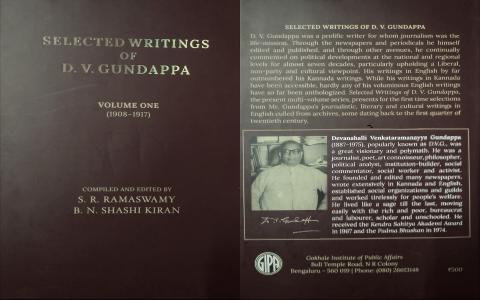
One of the highlights of this volume is the longform titled The Code of Manu. DVG firmly believed that (i) tradition and modernity are mutually complementary (ii) such a mutuality is a sine qua non for civilized progress and (iii) the frequently projected dichotomy between the two is gratuitous and regressive. To this end, he spent a considerable part of his literary labours to elucidate the message of classical texts from a contemporary...

As with Visvesvaraya, DVG enjoyed close contact with another Dewan of Mysore, Sir Mirza Ismail. DVG’s writings on him, too, present a wealth of insight rarely available elsewhere. Here is his assessment of Mirza’s tenure:
It cannot be claimed for Sir Mirza, and it need not be, that he brought original ideas or novel concepts to the art of government or the tasks of nation-building. Foundations for the building up of the State as a modern...

Volume Seven (1957–1960)
DVG’s literary output in the 1950s—both in English and Kannada—was staggering. After retiring from active public life, he gave himself to literary pursuits and produced a remarkable variety of works – expository, analytical, appreciative, contemplative. The present volume includes all these kinds of writing and touches upon statecraft, music, literature and philosophy. Biographical memoir and exegetical commentary,...

An important segment in the present volume is a set of articles that narrates and analyses the political-reform movement led by Jayaprakash Narayan. In these essays DVG has pinpointed the job cut out for the political reformer:
Sri Jayaprakash Narayan and those who like him who are interested in renovating public life and establishing a true democracy have to address themselves first to the task of increasing the quantum of honest and good...

Like all conscientious citizens endowed with intellectual integrity, DVG was a caustic critic of the Indira Gandhi Government. He repeatedly pointed out the unsoundness of her schemes and slogans, the most glaring example being Garibi Hatao:
Mrs. Indira Gandhi has over-simplified the problem of poverty as she has over-simplified even the problem of wealth. She and her father have tried twenty-five years to create wealth with the only result...

Book reviews were a constant feature in all the journals DVG edited and published. He either reviewed himself or, if he happened to spot a well-written piece, he sought the permission of the author and published it. How to put a work in perspective and appraise its value within the packed confines of journalistic writing, and, more importantly, how to infuse literary charm into the prose? DVG answers these questions with his own reviews. Sample...

Gokhale Institute of Public Affairs, an organization DVG built and nurtured, has made quiet but sustained efforts to educate people in all matters of collective living. Apart from conducting civic surveys, preparing reports for the perusal of Government and organizing lectures, it has played an active part in times of crisis. For instance, during the Indo-China war, it exhorted all its members and the people at large to contribute to the...

Volume Eight (1963–1967)
Readers of these volumes would surely know that DVG looked upon life as an undivided whole. This worldview enabled him to celebrate the arts, literature and all the fine graces of human life that are enriching on a personal level, and involve in socio-political activities that are beneficent at the collective level – all with the same zest and tenacity. What that literary savant, N Raghunathan wrote in a different...

DVG was deeply rooted in the philosophical tradition of India. Dharma as a concept was of absorbing interest to him. It engaged his energy throughout his life. In a sense, he was wedded to dharma. It is so constant a feature of his writings that we may consider it his idée fixe, albeit in a positive sense. His exposition of dharma alongside kindred concepts such as rta, satya, sattva, rajas, and tamas is a worthy contribution to Indian...

DVG never lost an opportunity to express his views on public affairs. To this end, he contributed to the leading periodicals of the country for many decades. In a popular article titled Thoughts on Republic Day, he mused on several important issues that plagued post-Independence India. He made a distinction between an ‘excited hour’ and an ‘average day’ and urged the leaders to promote moral integrity:
To take an excited hour of a special day...
